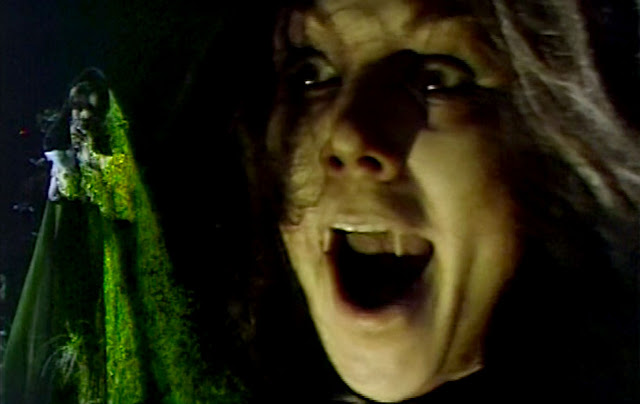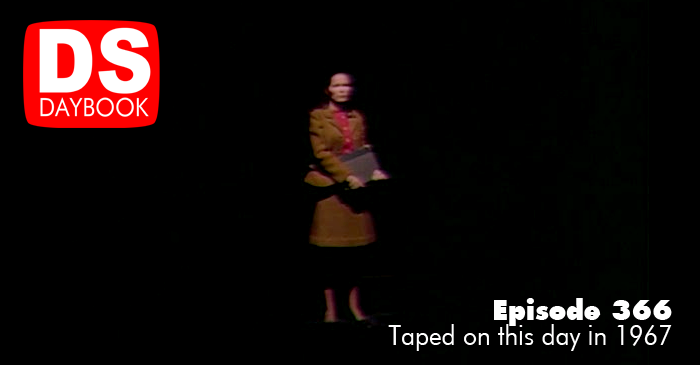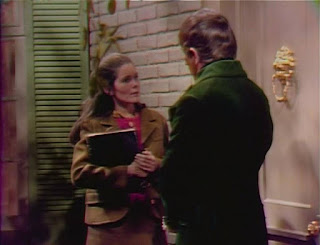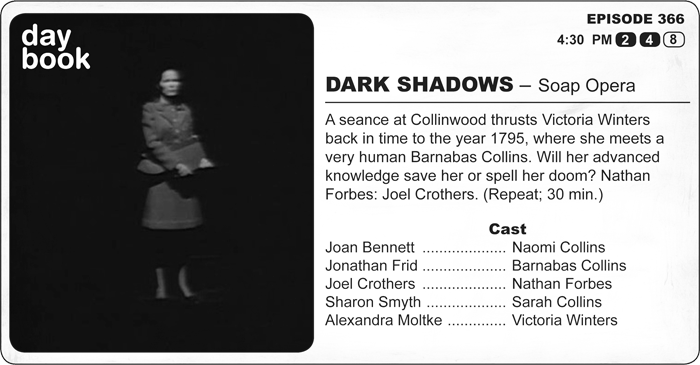When Barnabas finds himself back in the 1790’s, can he turn his greatest defeat into victory? Barnabas Collins: Jonathan Frid. (Repeat; 30 min.)
As Kitty vanishes into a portrait of Josette, Barnabas loses consciousness and awakens in 1795 on the eve of Josette’s suicide. He is determined to change history, confronting Angelique with honesty and a compassionate plea for mercy. She betrays him yet again, and shows Josette a vision of herself as a vampire high atop Widows Hill.
I used to think that this was all about Judah Zachery. It’s vaguely convenient to imagine him puppetmastering the whole thing to emotionally decimate the Collins family. As Saint Ming would say, he likes to play with things a little before annihilation. The Zachery Codex is awfully elegant, and it makes for some USDA prime smartypantsim. The longer I am with Dark Shadows, the more comfortable I am saying that these grand theories are just those. Maybe they are accurate. Certainly, if it helps you read the show, then subscribe to them by all means. Subscribe to enough of them and then McMahon may show up with a check. Let’s just hope it’s not his bar tab.
(By the way, I miss entertainment. Is it the 70s again? I’m ready for it to be the 70s again.)
However, just because a grand theory works for a lot of things, it doesn’t mean that it explains everything. The moral arc taken by Barnabas Collins could be seen as his torture, but it’s a spectacularly risky and unsuccessful one. After all, although it is emotionally ruinous, it leads to his ultimate success as an ethical man. It could be that some other source is influencing the narrative. For a long time, I couldn’t really figure out who it was. Now, I do.
Sarah.
Just because she’s a child doesn’t mean that she lacks the ability or gumption to manipulate as many spectral workings as possible. Perhaps this entire story is a contest of wills between the two of them. Because, when properly motivated, there are few things more unstoppable than a determined kid. What would motivate Sarah to take on Judah Zachary? Well, his one-time protégé, Angelique, may have strayed from her master, but he he still trained her. Imagine that you die and suddenly see the full narrative that drove your life and demise? Not only that, but if Sarah thought his student was bad news, the teacher was practically Newsmax.
But in death, Sarah realizes that she has a living agent, which is more than can be said for most of the regulars on The Love Boat. Her red right hand to punish Judah is her immortal brother. She knows Barnabas’ strengths, and more than that, she knows his failings. She knows that he is a raw element that must be tempered and honed before he can be properly deployed in battle. And, as with anyone who takes on transforming Poppin Fresh from an unbaked doughboy into a rockhard brick of weaponized melba toast, ready to scrape the roof of evil‘s mouth, there will be pain.
And it could be a combination of the two things. With Judah becoming increasingly aware of this inconvenient Vampire and his tough, grizzled, eight-year-old girl of a ringside Burgess Meredith, he puts more and more obstacles in the path. Looking at episode 855, it might be the result of the manipulation of Sarah. Or it might be the result of the manipulation of Judah Zachary. Or it could be the two of them going at it. Maybe Judah rips Josette into the past, and Sarah sends Barnabas after her. Or perhaps Sara has set the whole thing up to test her brother’s character.
The episode is a hidden treasure. Soon, the series will turn into a sequence of hidden treasures. Every episode will be a reward for having watched all of the others. But right now, this exists like the Time Trap sequence around the 660s. It’s a seemingly superfluous gift that exists more as an example of the show’s Hellzapoppin exuberance than as a piece of mechanical storytelling necessity. It feels like it’s their way of saying, “and here’s a special something for being a loyal viewer.“ After all, the show doesn’t exactly specialize in two or three episode “very special events.” We’ve been trained to expect this kind of side trip to last for months. In fact, Dark Shadows is the only show I know of where the special sequences contain fewer episodes than the average storyline, rather than more.
At this point, they don’t even really bother with a time travel mechanism. Basically, don’t stand too close to a portrait of Josette while there’s a fire going in the fireplace. Similarly, don’t look at someone who is standing too close to a portrait of Josette while there’s a fire going in the fireplace. It’s just science. And that’s not what you came here for. But if it is, give me a minute and I’ll put on a lab coat and Dr. Lang’s surgical chaps.
Still, this is part of the plot of the overall series, and if you want the benefits of any kind of overarching story themes, you have to put on an apron with me, grab a hammer, and bang away at these things in the rationalization forge. The fact that there is no seeming time travel mechanism is the entire point. It’s a wonderful mystery that invests us in interpreting the story. If we realize that part of the Leviathans’ plan is to both put the whammy in Barnabas AND hold, and let me see if I remember this correctly, the ghost of Josette as hostage (as a back up), then perhaps this was orchestrated by them to remind Barnabas of the intensity of his feelings for her. Maybe it was Sarah’s doing, to remind Barnabas of the stakes underlying his ongoing crusades. Or, you know, “Judah Zachary,” because it’s pretty convenient to blame him for everything from the destruction of Collinwood in 1970 to some of those sweaters they made David Henesy wear toward the end of the series.
It’s an immensely gratifying episode. It’s almost like seeing Barnabas at his high school reunion, vowing to undo everything he did to that bathroom stall in the science building when he was a sophomore. It’s one of the most authentic examples the series gives us of his evolution. Literally, a side-by-side portrait. You know, if one of the sides is hundreds of episodes prior. He is making the decisions we wanted to see him make In the first place. And he’s making the decisions that we suspected he was capable of back then. And now.
It’s Barnabas at his most tender and heroic. When he tells Angelique that he can only give her his gratitude, he is being honest. By 1840, that would be enough for her. So in a sense, it is as much of a trial for her as it is for him. His mistake is in seeing her as the woman who saved his life in 1897. Yes, people can change. But not yet. This moment of her embittered selfishness doesn’t make us hate her as much as it makes us pity her, and it adds a depth to the ultimate forgiveness that she will show him in their final voyage.
As he made plans with Kitty in 1897, we have never seen him happier nor more confident nor more fulfilled. This adds a harrowing context to the impersonal turn towards a larger evil that he will take in the next few episodes.
So, why? Why do they do this to him? If not the characters in the series, then the actual people making it?
Every time I think I know every kind of crazy there is, I meet an entirely new kind of crazy. And that’s how we learn. For Barnabas, a man with a tenuous relationship with reality at best, every time he thinks that the universe is finally reflecting his opinion of what it should be, it piledrives him into reality. And he must climb the steps of Mount Morality once again. But he is not a video game character, continually leveling up. If the real subtitle of the show is The Continuing Education of Barnabas Collins, his cycle of ethical awareness followed by cynical downfalls gives him greater and more nuanced understandings of humanity with each turn. Because it’s not just his story. It’s our story as we venture out of the idealism of the Enlightenment and into being enlightened.
The difference finally reveals itself in 1840. Up to the fall we are about to see, his heroism has been driven toward redressing who he was in the past, trying to bring the modern world into alignment with the aspirations of his era of origin. Everything he does is about repairing the past. Because the past is safe. The past is a known quantity.
What he has yet to attempt is building a bridge to the future unknown. That’s what his final arc, after this and after the Leviathans, will teach him to do. It’s based more on accepting what is rather than what should be, and guiding that with a courage that comes from saying, “I don’t know.“ Because to say that requires Barnabas to let go of his greatest fear: himself.
And he does. And good for him. And I would like to think, good for Sarah.
This episode was broadcast Nov. 14, 1969.




